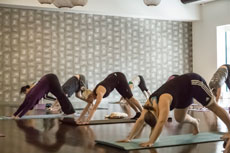
The YMCA of the North, a leading nonprofit dedicated to strengthening communities through youth development, healthy living and social responsibility, offers mindfulness programs and services to help people of all ages decrease stress, reduce anxiety, develop emotional and social intelligence, strengthen intuition and build a greater peace of mind.
Research indicates that mindfulness helps people suffering from stress, pain, trauma, and emotional, mental and social imbalances such as anxiety, depression, ADHD, irritable bowel syndrome and more. The Y teaches how mindfulness is a self-care practice that allows a person to transform how the mind reacts or relates to the world.
“Today’s world can be chaotic and challenging to navigate and then process experiences that happen to each of us and the Y is committed to showing how mindfulness can help,” said Sally St. John, senior director of wellbeing at the Y. “Mindfulness helps a person practice nonjudgement of thoughts, feelings and sensations and gives the body an opportunity to restore and repair on it its own terms.”
St. John further explains that mindfulness means having intention to be attentive, being open to the idea of being present and honest with oneself, and observing what’s happening rather than trying to control what’s happening.
The Y team provides mindfulness programs and services that are flexible and can meet the needs of each person. Examples include:
- George Wellbeing Center - The George Wellbeing Center is a space for individuals and groups to prevent and address chronic health symptoms using evidence-informed, holistic healing approaches for mind, body, spirit and community. Mindfulness offerings include:
- Daily free mediation: a great way to begin or maintain a meditation practice in a group setting on a drop-in basis. During a group session, the Y instructor will guide people into a deeper state of calm as they sit or recline comfortably.
- Singing Bowl Mediation: crystal bowls are played to guide the body into a deeper state for calm as one sits or reclines comfortably.
- Qi Gong: a slow movement meditation from Traditional Chinese Medicine. “Qi” means breath or air and is the energy of the human being. “Gong” means the commitment or effort you put into practice.
- Yin Yoga: a quiet style of yoga that balances the more active (yang) movements. Yoga poses are held for one to five minutes to stimulate release or blocked energy channels and meridians.
- MindUP – The Y offers MindUP, a mind-body curriculum of The Goldie Hawn Foundation that empowers children and teens through mindfulness-awareness training rooted in neuroscience, positive psychology, social and emotional learning. The partnership is being launched at YMCA Neighborhood Centers, New Hope and Midway YMCA Early Childhood Learning Centers and Harold Mezile Youth Teen Enrichment Center with more Y sites to come in the future.
- Yoga - Yoga means union and is an Eastern spiritual tradition that began in India. Yoga is the practice of quieting and observing of the mind, by moving through physical poses. Classes are available at the George Wellbeing Center and all YMCA fitness sites.
- Tai Chi – Tai Chi, a Chinese martial art practiced for self-defense, health benefits and meditation, involves a series of movements performed in a slow, focused manner and accompanied by deep breathing. This gentle physical exercise features postures that flow from one to the next without pause, ensuring that your body is in constant motion.
Discover how an 11-year-old boy uses meditation and mindfulness to help him remain calm on the basketball court and in school – Suvan’s Story
Learn how YMCA Neighborhood Centers teach mindfulness to young program participants and support their families through the MindUP curriculum – YMCA MindUP
10 Mindfulness Tips and Techniques
There are many ways to bring mindfulness into a person’s life and these tips help provide some ideas:
- Create a Mindful Corner for home, work or school that can include: Mindful Glitter Jar, Chime, Coloring, Hoberman Sphere, music (rain sticks and drums), heavy blankets (for weight), eye masks, essential oils, etc.
- Download a mindfulness app such as Insight Timer, Headspace, Calm
- Create a bed-time routine
- Turn off screens one hour before bed
- Use a hot water bottle or weighted blanket to calm the nervous system
- Align day with the circadian rhythms
- Use an essential oil diffuser to hydrate the air
- Take 1-minute brain-breaks throughout the day
- Manage energy, not time
- Enjoy restorative practices at the George Wellbeing Center such as massage/bodywork, singing bowl meditation, acupuncture, hydromassage and more
- Attend a Y Wellness Retreat and experience the splendor of the natural environment of camp through holistic wellbeing programming and individualized exploration.
- Eat mindfully at meal time by sitting down, chewing the food slowly and enjoying the sight, smell, texture and taste of the food.
- Take a mindful walk in nature and pay attention to the sights, sounds and smells of being in the great outdoors in fresh air.
- Participate in a yoga class where you will focus on breathing.
Because the YMCA is a leading nonprofit committed to helping everyone thrive, financial assistance is available to those in need. To learn more about the Y’s programs, please visit ymcamn.org.